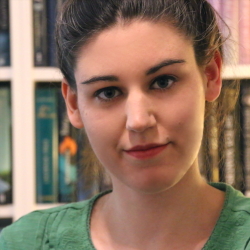The Republic of Gilead offers Offred only one function: to breed. If she deviates, she will, like dissenters, be hanged at the wall or sent out to die slowly of radiation sickness. But even a repressive state cannot obliterate desire – neither Offred’s nor that of the two men on which her future hangs.
Brilliantly conceived and executed, this powerful evocation of twenty-first century America gives full rein to Margaret Atwood’s devastating irony, wit and astute perception.
Damn! This is by far the best (and worst) dystopia I’ve ever read! Best, because it’s exactly what I’m looking for in a dystopia. Worst, because it’s so eerily topical I had to check the copyright page several times because I could not believe this was first published in 1985.
I always had issues with YA dystopias because they weren’t dystopian enough for my taste. For me, a dystopia is supposed to tell a story set in a dystopian system/society that does not involve one person overthrowing and dismantling the system ending with a more or less neat little bow. A dystopia is supposed to be raw, challenging the beliefs and morals of the reader and leaving the ending open to interpretation. The Handmaid’s Tale is exactly that.
I don’t really know how to put this novel into words – it’s a book best read by oneself. Therefore, I only put together a short list addressing the things that make this novel great – and the one thing that cost it its fifth star.
- I loved the writing style. It’s gorgeous and immediately draws you in.
- I loved the narration. The glimpses into the past and the facts slowly but steadily coming together really keep you glued to the pages.
- I loved how the characters were portrayed. Often only touched upon, staying mostly superficial, which fits so perfectly a story set in a society where speaking out can get you killed if overheard by the wrong ears. Actions speak louder than words so there’s still room to find out more about them when the story progresses.
- I loved the world building. It’s actually quite small scale based on the information and knowledge the narrator can gather. Yet, it’s still a quite intricate structure built around this horrible ideology. It’s bleak. I was appalled and shocked and horrified especially considering world affairs. It all makes one truly feel scared and helpless.
- I loved the open ending, leaving so many questions open. (And I really don’t know how I feel about the sequel. It really doesn’t need one at all, but I’m probably going to read it anyway. I just hope I won’t regret it.)
- But I hated the last twenty pages. They totally pulled me out of it and confused the hell out of me. I had to read up on them and I’m still not sure they do serve a grand purpose. It’s these pages that cost this novel its fifth star – they feel this out of place there’s just no way I can turn a blind eye to them.










Das Ende fand ich auch richtig doof! Irgendwie langweilig zu lesen. Ich meine, die Idee ist ja eigentlich interessant und es ordnet auch die Geschichte der Handmaid besser ein, aber mir hat der Roman ohne den Part auch besser gefallen.
Es hat mich so komplett rausgerissen. Es hätte durchaus eine Bereicherung sein können, wäre es nicht so furchtbar langweilig und trocken gewesen. Hast du das neue Buch schon gelesen? Ich habe ihn zwar schon, bin aber noch ein bisschen unschlüssig, wann ich dazu greifen soll. Das ist mal wieder so ein Fall, wo ich finde, dass es keine Fortsetzung gebraucht hätte.
Ja, hab ich. Ich bin und war auch der Meinung, dass es keine Fortsetzung braucht. Ich würde empfehlen, die beiden Bücher im Kopf ein wenig getrennt voneinander zu sehen. The Testaments ist viel unterhaltender und leichter zu lesen als THT, hat also von der Warte her seine Vorzüge, aber es kann überhaupt nicht mit seiner Vorreiterin mithalten, weder inhaltlich noch an subtiler Kritik.
Dann bin ich mal gespannt! Werde aber vielleicht noch ein bisschen warten, um etwas mehr Abstand zu gewinnen …